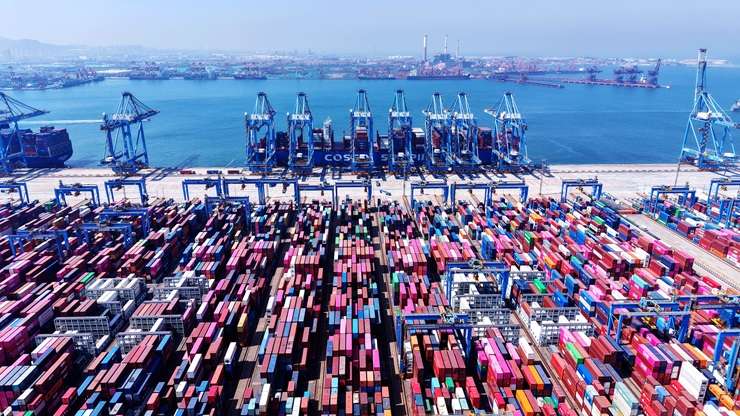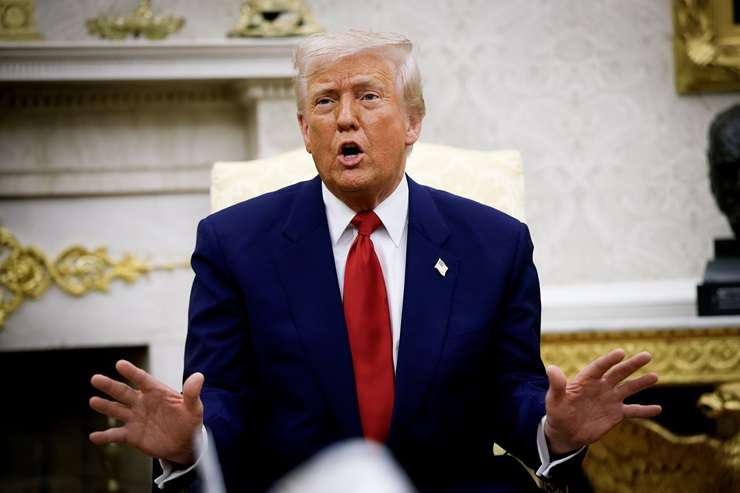- Mortgage rates in New Zealand are likely to fall due to global trade tensions.
- Economists warn of potential economic slowdown and job losses from the US-China trade war.
- Lower rates benefit households, but uncertainty and reduced demand for exports pose risks.
As Donald Trump dangles the world at his feet, mortgage holders in New Zealand can breathe a small sigh of relief, at least for now.
Start your property search
Experts say the silver lining in the global chaos created by the up and down of Trump’s tariffs is the likelihood of interest rates at home falling further - good news for the many people who had fixed for short-term rates and may roll over onto lower rates in coming months.
However, there is a warning attached. Indirect impacts from the trade war between New Zealand’s two biggest trading partners, the United States and China, will still pack a punch.
On the horizon could be a weaker economy and job losses. OneRoof canvassed insights from leading economists and market experts. All agreed that further cuts to mortgage rates were on the cards, but they also believe there's still plenty to be worried about, citing the unpredictability of the US President. Everything, they said, could change by lunchtime.
Kiwibank’s chief economist, Jarrod Kerr, said direct trade with the US by New Zealand was unlikely to be affected, if at all. “We export beef, which goes into American burgers and they love it. I don't think they're going to stop eating Kiwi beef because there's less than a 10% price hike on it.”
But Kerr was concerned about the White House's escalating trade war with China. “Our largest trading partners are going at it head to head, hammer and tong,” he said.

Kiwibank chief economist Jarod Kerr says the crisis is still manageable at this stage. Photo / Supplied
A significant slowdown in both the US and Chinese economies was likely. “Amazon has already cancelled a whole bunch of orders. A whole bunch of inventory from China - instantly, just cancelled it. There's no doubt a lot of American companies will be doing the same thing.”
Kiwis could benefit from the fallout, with goods intended for the US shipped to New Zealand at a discount, but the global growth picture could see lower demand for New Zealand goods and services, and commodity prices could fall.
The crisis was still manageable at this stage, with central banks intervening if necessary. “They have the ability to print money and buy government bonds, and even buy stocks if they really need to, and they have obviously got the ability to cut interest rates.”
Kerr believes the Reserve Bank will continue to cut the OCR, and banks will continue to cut their mortgage rates, which will help households and businesses and support growth in the housing market.
Discover more:
- Tony Alexander: What the latest OCR cut means for the market and home loan costs
- TV star Jeremy Corbett and wife Megan sell their forever home for $4.5m
- How much is your suburb worth? Another region joins the $1m house
Kerr does not think rates will reach the record lows seen immediately after the Covid pandemic struck - unless the global situation worsens - but the floor had not been reached yet.
Kerr said what worried him most was that tariffs had risen to levels last seen in 1905. There were two world wars after that and then 80 years of globilisation, which meant countries traded with each other more and more and were “much more likely to settle things through negotiation than lobbing bombs at each other”.
However, the world was now seeing increase in de-globilisation, with countries putting up tariffs and fighting more. “There's been an increase in trade restrictions since 2010. It's just getting to a point of an all-out trade war, which doesn't look good.”
Westpac’s chief economist, Kelly Eckhold, said tariffs were a tax imposed by a country on imported goods and meant people in those countries paid more for the goods.
Because New Zealand was not imposing tariffs, the impacts would be indirect, in the form of less demand for Kiwi goods from the US and China. “The people living in those countries are going to be paying more for the same stuff and as a result they are going to be a little bit poorer for that," he said.

Goods from China may be offloaded to countries like New Zealand for lower prices. Photo / Getty Images
“The bottom line for it all is that this change in the global trade system probably means New Zealand economic growth/incomes would be a bit lower.”
With the New Zealand economy likely to grow less quickly than it might otherwise have, inflation could fall back, and as a result, interest rates could fall, he said.
The Reserve Bank would likely cut the OCR to about 2.7%. While lower interest rates were positive for households, and could lead to higher house prices, Eckhold noted the reason interest rates were falling was the global trade war and that reduced demand for the things New Zealanders sold in international markets.
In turn, that meant the labour market here could be weaker than it might otherwise have been, and unemployment could rise. “It could be the reason your mortgage rate is going down is because maybe some of these more negative things are happening in the economy," he said.
“It’s actually still really uncertain in terms of firstly how much interest rates will even go down but certainly how house prices will respond.”
ASB senior economist Mark Smith said the only certainty at the moment was uncertainty. “The world economy is now looking a lot more tenuous and a lot of those downside risks are looking like they're going to flow through and the global economy will slow, and that will in turn slow the New Zealand economy.”

Westpac chief economist Kelly Eckhold: "The reason your mortgage rate is going down is because maybe some of these more negative things are happening in the economy." Photo / Fiona Goodall
With uncertainty, New Zealand firms and households would likely become nervous and pull back in investment and hiring. “The Reserve Bank will be probably looking to move from a time when they've been essentially trying to slow the economy to trying to support the economy in the next few months.
“What that really means is interest rates in New Zealand will be falling. They’ve been falling now and they're likely to continue to fall. In terms of the OCR, we expect a further 75 basis points of cuts from here over the next few months.”
That meant lower mortgage rates were likely, “so there is a silver lining there but there's also some costs to the economy from this volatility.”
BNZ’s chief economist, Mike Jones, also spoke of uncertainty being the number one issue: “We’re essentially in an unforecastable, unpredictable environment," he said.
“It's very, very difficult in the current situation for anyone to be making concrete predictions about anything really.”
Despite the rapid changes around tariffs, there would be a material negative impact on the global economy.

US President Donald Trump is proving unpredictable. Photo / Getty Images
“Big investment decisions tend to stall in this sort of environment so we're starting to see some of those effects already. Probably the most certain thing you can say at the moment is there is going to be some negative effects from that coming through.”
The BNZ had been forecasting a sub-3% OCR for almost two years and had not moved on that, he said. If that came to pass, mortgage rates would likely keep falling – but any such prediction had to carry a big dsclaimer given the unpredictability coming out of the US.
He expected a modest shift in house prices this year, but pointed out the price hikes seen after Covid had a background of a housing stock shortage, but this time round there was an over-supply of stock.
Andrew Chambers, CEO of Tella mortgages, also said banks were likely to continue to drop mortgage rates over the remainder of this year.
Major banks had lowered their calculations of loan servicing and that was an indication they were comfortable the rates would continue to trend down, he said.
Chambers said New Zealand was seen as a safe haven for bad times, “a Plan B for high net worth and [we] often see investment and money flowing into it when things are bad elsewhere.
“We see a lot more migration inflows in bad times than in good and our dollar goes up in these cycles as investors move out of USD into NZD.
“These things are positive in a lot of ways and could stimulate the economy, but the one thing to watch is what happens to our export sector if our NZD is high.”
Chambers aid he did not think borrowers needed to worry too much about the cost of their debt going up, and they probably would not see the cost of their consumables going up.
“But there is a risk that for a big chuck of New Zealand, the downstream effects of China, Australia, US and EU, our four largest trade partners, not doing well will impact corporate/rural New Zealand, holding our market and economic/job growth back.
“I'm always positive about the general direction of New Zealand as we have migrant inflows when we need them and will continue to grow, but we are export-led so we'll need to watch this space.
“Overall, we may come out better off than many of the countries we compete against, such as Italy, Chile, etc.”
- Click here to find properties for sale















































































